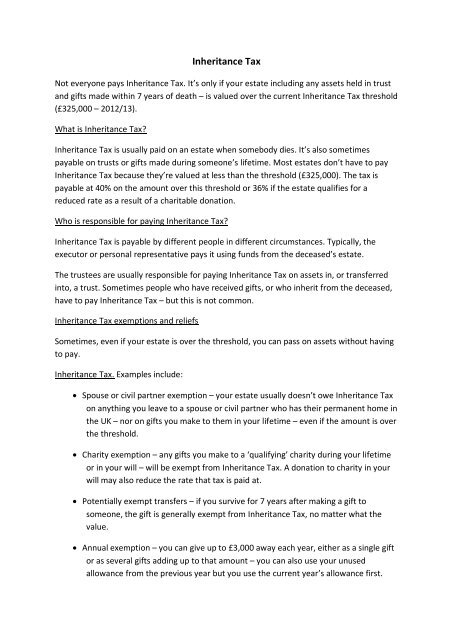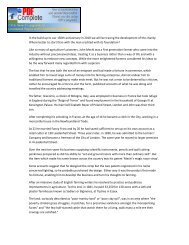Inheritance Tax
Inheritance Tax
Inheritance Tax
You also want an ePaper? Increase the reach of your titles
YUMPU automatically turns print PDFs into web optimized ePapers that Google loves.
<strong>Inheritance</strong> <strong>Tax</strong><br />
Not everyone pays <strong>Inheritance</strong> <strong>Tax</strong>. It’s only if your estate including any assets held in trust<br />
and gifts made within 7 years of death – is valued over the current <strong>Inheritance</strong> <strong>Tax</strong> threshold<br />
(£325,000 – 2012/13).<br />
What is <strong>Inheritance</strong> <strong>Tax</strong>?<br />
<strong>Inheritance</strong> <strong>Tax</strong> is usually paid on an estate when somebody dies. It’s also sometimes<br />
payable on trusts or gifts made during someone’s lifetime. Most estates don’t have to pay<br />
<strong>Inheritance</strong> <strong>Tax</strong> because they’re valued at less than the threshold (£325,000). The tax is<br />
payable at 40% on the amount over this threshold or 36% if the estate qualifies for a<br />
reduced rate as a result of a charitable donation.<br />
Who is responsible for paying <strong>Inheritance</strong> <strong>Tax</strong>?<br />
<strong>Inheritance</strong> <strong>Tax</strong> is payable by different people in different circumstances. Typically, the<br />
executor or personal representative pays it using funds from the deceased’s estate.<br />
The trustees are usually responsible for paying <strong>Inheritance</strong> <strong>Tax</strong> on assets in, or transferred<br />
into, a trust. Sometimes people who have received gifts, or who inherit from the deceased,<br />
have to pay <strong>Inheritance</strong> <strong>Tax</strong> – but this is not common.<br />
<strong>Inheritance</strong> <strong>Tax</strong> exemptions and reliefs<br />
Sometimes, even if your estate is over the threshold, you can pass on assets without having<br />
to pay.<br />
<strong>Inheritance</strong> <strong>Tax</strong>. Examples include:<br />
· Spouse or civil partner exemption – your estate usually doesn’t owe <strong>Inheritance</strong> <strong>Tax</strong><br />
on anything you leave to a spouse or civil partner who has their permanent home in<br />
the UK – nor on gifts you make to them in your lifetime – even if the amount is over<br />
the threshold.<br />
· Charity exemption – any gifts you make to a ‘qualifying’ charity during your lifetime<br />
or in your will – will be exempt from <strong>Inheritance</strong> <strong>Tax</strong>. A donation to charity in your<br />
will may also reduce the rate that tax is paid at.<br />
· Potentially exempt transfers – if you survive for 7 years after making a gift to<br />
someone, the gift is generally exempt from <strong>Inheritance</strong> <strong>Tax</strong>, no matter what the<br />
value.<br />
· Annual exemption – you can give up to £3,000 away each year, either as a single gift<br />
or as several gifts adding up to that amount – you can also use your unused<br />
allowance from the previous year but you use the current year’s allowance first.
· Small gift exemption – you can make small gifts of up to £250 to as many individuals<br />
as you like tax‐free.<br />
· Wedding & Civil Partnership gifts – gifts to someone getting married or registering a<br />
civil partnership are exempt up to a certain amount.<br />
· Business, Woodland, Heritage & Farm Relief – if the deceased owned a business,<br />
farm, woodland or National Heritage property, some relief from <strong>Inheritance</strong> <strong>Tax</strong><br />
may be available.<br />
Deadline for paying <strong>Inheritance</strong> <strong>Tax</strong><br />
In most cases, you must pay <strong>Inheritance</strong> <strong>Tax</strong> within 6 months of the end of the month in<br />
which the deceased died. After this, interest will be charged on the amount outstanding.<br />
You can pay in yearly instalments over 10 years if the value of the estate is tied up in<br />
property such as a house.<br />
More information on <strong>Inheritance</strong> <strong>Tax</strong> can be found at www.hmrc.gov.uk.
















